


Jaime Peñafiel, Spanish columnist and correspondent for Spanish society magazine ¡Hola! at the Persepolis celebrations, asked, 30 years on, to describe the grand state banquet at the Tent City said: “It was, undoubtedly, the most fabulous party that I ever attended. That banquet was the expression of the most absolute luxury but also of the most complete refinement. It was the greatest of all the parties of the century and it is very possible that a similar one is never organized again.” (in Fiestas que hicieron historia, Marta Rivera de la Cruz, Ed. Temas de Hoy, S.A. 2001)
The magic of Persepolis could indeed be summed up in the unmatchable magnificence of the grand state banquet, held in the Banqueting Hall on the evening of the 14th October 1971, likely the greatest party ever held and one that will hardly be beaten in its splendour. Dozens of heads of state in full gala, wearing their highest decorations, women wearing the most awesome dresses and the most fantastic jewels, the glitter of Empire in its maximum expression, in the dinnerware, in the decoration, in the menu, in the uniforms of the members of the Imperial Household, basically… everywhere.

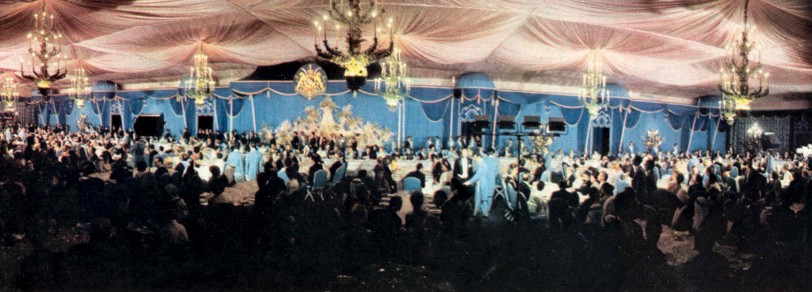
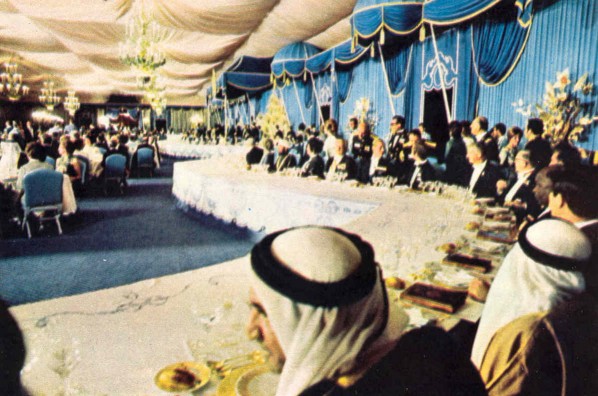
As remarked before, the menu was prepared by Maxim’s from Paris, the world-famous restaurant that was in charge of the catering during the celebrations, for that purpose having to close the Paris restaurant for 15 days. The menu read: “Banquet offered by Their Imperial Majesties The Shahanshah Aryamehr and The Empress of Iran in honour of Their illustrious guests taking part in the ceremonies of the 2500th anniversary of the foundation of the Persian Empire by Cyrus the Great”. The unforgettable banquet began with quail eggs stuffed with Iranian caviar (extracted from sturgeons of the Caspian Sea), with wine Château de Saran, and continued with crayfish mousse, accompanied with Château Haut Brion Blanc 1969, roast lamb with truffles, with Château Lafitte Rothschild 1945, and champagne sorbet (1911 Möet).
Symbol of the Iranian Monarchy, the peacock was also in the menu: roast peacock stuffed with foie gras was the one that made the headlines and was accompanied with Musigny Comte de Vogue 1945 en magnum. To the sound of the orchestra and the Mozart and Schubert pieces, the repast finalized with oporto glazed fig with raspberry. The coffee was accompanied by Cognac Prince Eugène (de chez Maxim’s). For the toasts, champagne Dom Perignon Rose 1959 (Möet Chandon).
During the state banquet, seated between Queen Ingrid of Denmark and Queen Fabiola of the Belgians, the Shah, in his military dignity and splendour, arose to make a brief speech, in which he underlined the presence of so many heads of state there, in the land of Cyrus, Darius and Xerxes. His Imperial Majesty thanked his guests for their presence and asked them never to break their friendship ties with Iran, underlining the he saw as a good sign that leaders of such different nations were dining under the same roof. Afterwards, it was time for a spectacular son et lumière show outside, where temperatures had dramatically fallen.
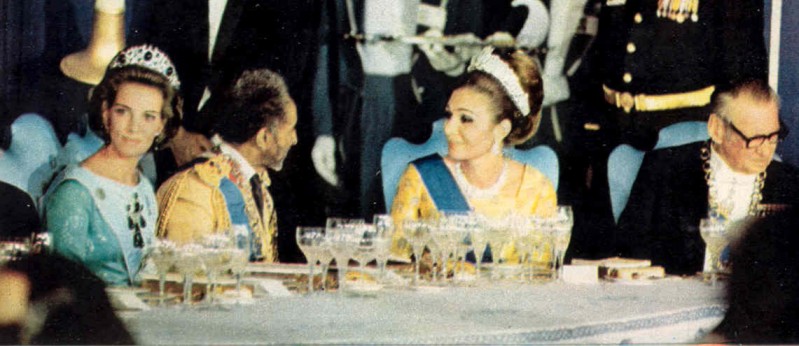

The display was, by all means, truly grand. It reviewed the story of Persepolis: “From the tomb in the mountainside overlooking the ruined palaces where he ruled 500 years before Christ, the voice of Darius the Great spoke in the dark, but in French. Andre Castelot, France's eminent historian, recounted the glories of Xerxes and the last days of the Persian empire. The columns of Persepolis were bathed in white light then gradually they turned red and the sound of fire mixed with the drunken orgy of Greek soldiers. It was the sacking of Persepolis by Alexander all over again. The guests were thrilled and applauded.” (in We are awake – 2500-year celebrations revisited, Cyrus Kadivar, The Iranian, 2002)
Then, the unexpected happened: at the end of son et lumière display, a dramatic fireworks display was supposed to have burst into the skies of Persepolis. It didn’t. Recalling the Persepolis events he had helped to organize, Mr. Abdolreza Ansari said, 30 years later: “Even the best of plans can go wrong. When the son et lumière show ended, the lights went out and we were plunged into darkness for about 3-4 minutes. Then suddenly, an explosion. A fantastic display of fireworks lit the sky sending shivers down a few people who thought it was a terrorist attack. Well, this went on for a few minutes and still the lights did not come on. At this point everybody became worried. I ran quickly to the control room while the fireworks exploded above me. The man responsible for the lights was an ordinary worker. He was standing outside his room so overwhelmed by the show that he had forgotten to switch back on the lights. Well, I got that fixed.” (in We are awake – 2500-year celebrations revisited, Cyrus Kadivar, The Iranian, 2002)
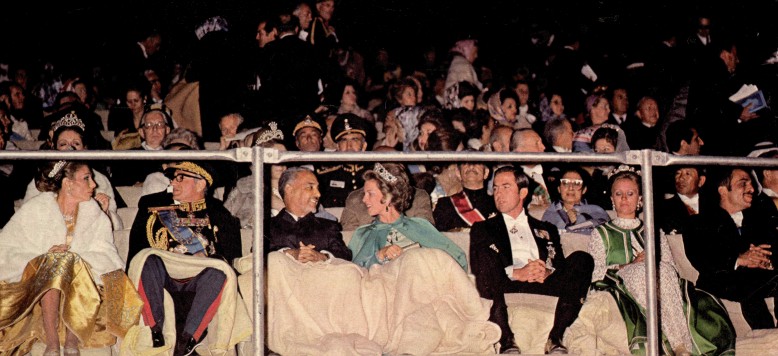
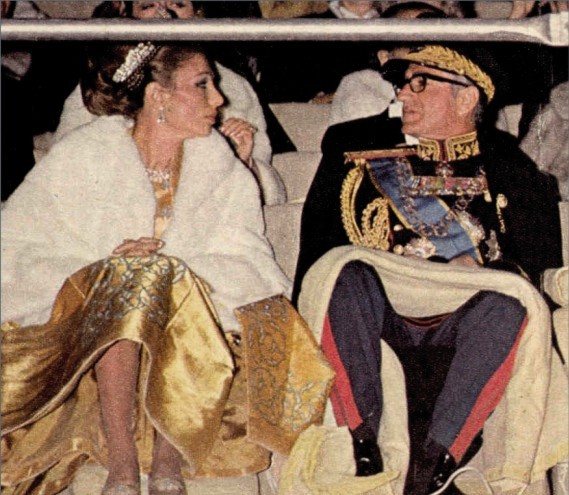

The fireworks were a dramatically unique finale to an evening never to be forgotten. All the guests were amazed by the display and the show that had taken place before it. Blankets had been provided so that the low temperatures wouldn’t affect the potentially frail guests (like the old Emperor of Ethiopia) too much. The mood was also matchless: everyone was radiant, relaxed and happy; as if it was the most wonderful night of their lives… All the guests followed the Shah and the Shahbanou back to the tents, where the evening came to an end between relaxed tête-à-têtes. The smiles were everywhere, the diamonds sparkled brightly and the uniforms fulfilled the Banqueting Hall. It was a night of glory for Iran, for the Empire, for Cyrus, Darius and Xerxes, for all the Persian dynasties. It was, above all, the night of the recognition of the immense and inestimable work that the Shah had done for Iran in the decade before. The world recognized it with their presence.
Undoubtedly the banquet of the century, this glittering bash, with such unique and delightful aspects, from the tiaras and orders, to the tables and chandeliers, from the ceiling to the golden peacocks, from the roast peacock to the splendorous titles, was probably also the greatest party ever held. The enchanting anachronism of it all made it even more appealing and exceptional: there, in the very middle of the desert, in the middle of a ruined palace, were all the great leaders of the World: emperors and kings, presidents and prime ministers, capitalists and communists, from the West and the East, from the North and the South, in their grandest dresses, in their most sparkling uniforms; there, in the very middle of the desert, living in a city which seemed brought from a fairytale, with all the comfort and exquisite glamour that no one had possibly thought of achieving in such an arid place, were all those mighty and prominent people surrounding the only head state that could manage to gather them: His Imperial Majesty The Shah of Iran.
